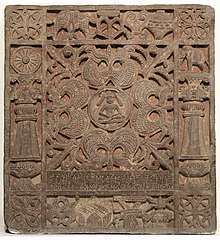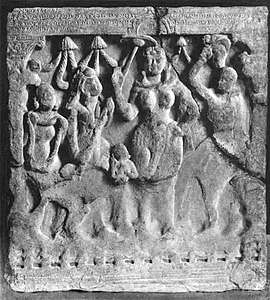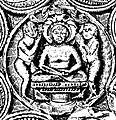Ayagapata
Ayagapata (Hindi:अयागपट्ट) or Ayagapatta is a type of votive slab associated with worship in Jainism.

Background
Numerous such stone tablets discovered during excavations at ancient Jain sites like Kankali Tila near Mathura in India. Some of them date back to 1st century C.E. These slabs are decorated with objects and designs central to Jain worship such as the stupa, dharmacakra and triratna.[1]
A large number of ayagapata (tablet of homage), votive tablets for offerings and the worship of tirthankara, were found at Mathura.[2]
Description
These stone tablets bear a resemblance to the earlier Shilapatas - stone tablets that were placed under trees to worship Yakshas. However, this was done by indigenous folk communities before Jainism originated suggesting that both have commonalities in rituals.[1] A scholar on Jain art wrote about an Ayagapata discovered around Kankali Tila,"The technical name of such a tablet was Ayagapata meaning homage panel."[3] Kankali Tila tablet of Sodasa is one of the important Ayagapata. This Ayagapata is an adoration to Mahavira dating back to circa 42 CE.
Gallery
- Ayagapatta, Jain Tablet of homage showing a Jain stupa (Circa 1st Century CE) (Photo:Government Museum, Mathura)[4]
 A Kankali Tila plate, with an inscription mentioning the year 42 of the reign of Northern Satraps ruler Sodasa
A Kankali Tila plate, with an inscription mentioning the year 42 of the reign of Northern Satraps ruler Sodasa The Jina Parsvanatha (detail of an ayagapata), Mathura circa 15 CE, Lucknow Museum.
The Jina Parsvanatha (detail of an ayagapata), Mathura circa 15 CE, Lucknow Museum.- Jain Ashtamangala, 1st century
 Sivayasa Ayagapata, Kankali Tila
Sivayasa Ayagapata, Kankali Tila- Upper Half of Ayagapatta with Miniature Tirthankara and other sacred symbols, circa 1st Century CE
See also
- Jain art
- Kankali Tila
- Mathura museum
References
Citation
- "Ayagapata". Encyclopædia Britannica. Retrieved 18 April 2012.
- Jain & Fischer 1978, pp. 9–10.
- "An ayagapata or Jain homage tablet, with small figure of a tirthankara in the centre and inscription below, from Mathura". British Library. Retrieved 18 April 2012.
- Quintanilla, Sonya Rhie (2000). "Āyāgapaṭas: Characteristics, Symbolism, and Chronology". Artibus Asiae. 60 (1): 79–137 Fig.26. doi:10.2307/3249941. ISSN 0004-3648. JSTOR 3249941.
Sources
- Jain, Jyotindra; Fischer, Eberhard (1978), Jaina Iconography, 12, BRILL, ISBN 9789004052598